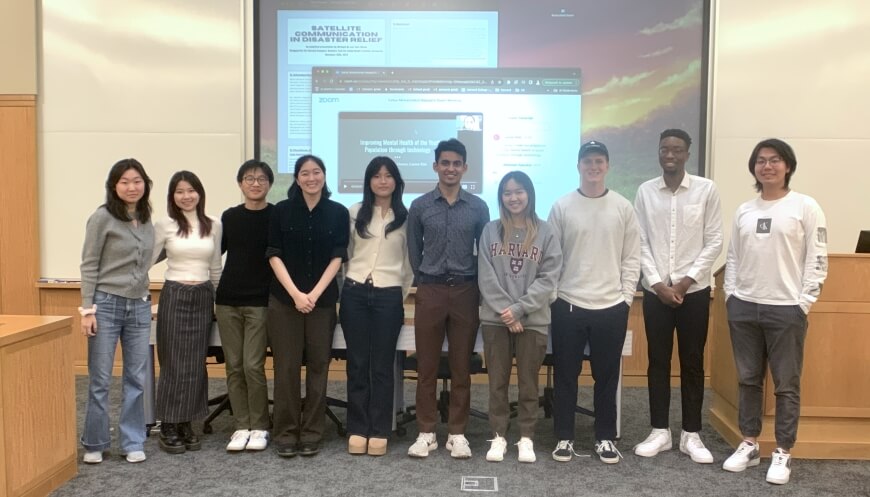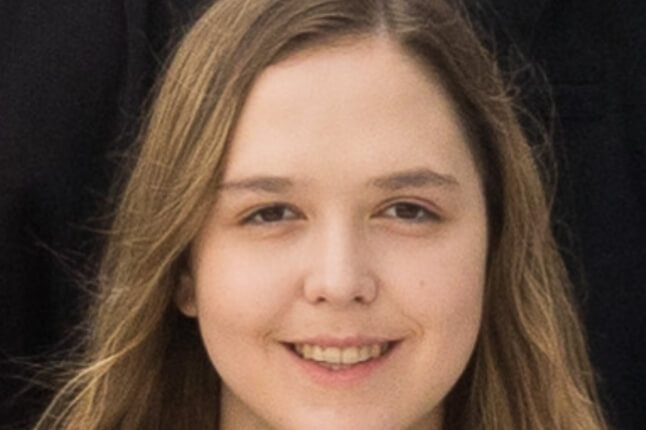News
The Harvard Tech and Global Health Initiative leadership board and fall fellows (Matt Goisman/SEAS)
If properly trained, artificial intelligence could be used to aid physicians in detecting early signs of cognitive or mental health disorders. If properly deployed, satellites could greatly improve telecommunications during natural disaster relief efforts. If used correctly, smartwatches and other wearable technology could help the elderly maintain their independence.
Finding technological solutions to medical and healthcare challenges is the goal of the Tech and Global Health Initiative (TGHI). A new subgroup within the Harvard Computer Society, TGHI was founded by third-year computer science concentrator Aurelia Huiwen Chen under the guidance of Fawwaz Habbal, Senior Lecturer on Applied Physics at the Harvard John A. Paulson School of Engineering and Applied Sciences (SEAS). The organization is meant to bridge the gap between technological innovation, medicine and global health.
Chen started TGHI as an interest group with the Harvard Global Health Institute last fall. Over the ensuing year, she worked with co-executive director Maxine Park to grow it as a club, eventually merging it into the SEAS-affiliated Harvard Computer Society student organization, and forming a leadership board that includes multiple SEAS students. They also recruited Joel Ray, a retired neurosurgeon, Patty Ray, a health lawyer, and Ben Reis, Director of the Predictive Medicine Group and Harvard Medical School faculty, as advisors.
As the group grew, Chen and Park discovered that while some students joined with prior computer science or technology experience, others were more interested in healthcare and had no engineering background.
“One of the big things we were thinking about when starting the club was how we make tech clubs more accessible to students on campus,” said Park, a second-year student studying computer science and math. “We wanted to have people with a lot of experience, but we also wanted to offer an opportunity for people with no experience at all and no computer science training before college. It’s a learning process, and college is definitely not too late to start learning these topics.”
This fall, TGHI offered an eight-week fellowship in which 15 participants learned about a range of health and technology topics and developed new technical skills. The fellows presented on topics related to the intersection of technology and global health at the end of the fall semester.“When we were selecting fellows, we didn’t have criteria for any prerequisite knowledge,” said third-year student Carl Ma, co-director of education. “We wanted people from diverse backgrounds and experiences to contribute in different ways to these very intersectional issues."
The intention isn’t to serve a small community on campus, but to foster a curiosity and mission-driven motivation for technology and global health.
The five research presentations covered a range of technologies, demographics and communities. Eshan Mehra and David An looked at synthetic biology as a way to improve access to organ transplantation in lower-resourced areas of the world, while May Ng and Maggie Richardson analyzed what technologies could enhance independence for elderly people.
“It was a great way to really expand my knowledge of how you can approach different topics with different mindsets,” said Mehra, who’s in his first semester at Harvard. “The fellowship also introduced me to a lot of new topics, such as predictive artificial intelligence. I really hadn’t thought about these applications to global health, but it was really enlightening to think about new career paths and just try something new.”
Predictive artificial intelligence (AI), a subject Reis taught to the fellows, was a recurring technology in several of the presentations. Jennifer Arakaki, Elizabeth Peng and Christian Chiu applied it to Alzheimer’s disease, presenting on how AI could be used to notice signs of the disease much earlier than conventional testing. Lauren Kim, Billan Mahdi and Safaa Hassan presented the technology for an app that uses AI to help improve the mental health of young people.
“I came into this fellowship planning to concentrate in biology, maybe with a global health secondary. But after seeing the applications this technology can have, it inspired me to switch my pathway to one that is more all-encompassing of science, technology and global health,” said Arakaki, a second-year student now studying computer science and neuroscience.
Tyler Nilson and McKayla Ro initially planned to look at heart disease and diabetes in tropical countries, but their research took them in an unplanned direction. Looking at the impact of Hurricane Maria on the Caribbean in 2017, they realized telecommunications during disaster relief needed improvement.
“I had a hard time believing the best we have are ham radios and satellite phones,” said Nilson, a second-year student studying human developmental and regenerative biology. “I feel like we have a lot of really cool technology, and there has to be a better way.”
TGHI plans to further develop Nilson and Ro’s research next spring with a project on disaster relief and resource allocation. Fall fellowship projects had to include a literature review on their subject matter, but beyond that fellows were free to implement their research through a website, app or other medium.
With the fellowship now over, TGHI can begin implementing some of its projects on a larger scale during the spring semester.
“The students’ capacity to have ethics, compassion and curiosity, their maturity and excitement moving forward, when you layer that with the technical education and collaboration of the fellowship, the maturity is almost instantaneous,” said advisor Joel Ray, part of the Senior Common Room at Winthrop House. “They’re so bright and curious, they’re immediately moving to solutions.”
Topics: AI / Machine Learning, Computer Science, Health / Medicine, Student Organizations, Technology
Cutting-edge science delivered direct to your inbox.
Join the Harvard SEAS mailing list.
Press Contact
Matt Goisman | mgoisman@g.harvard.edu



